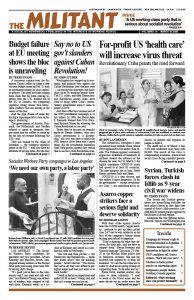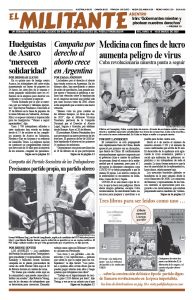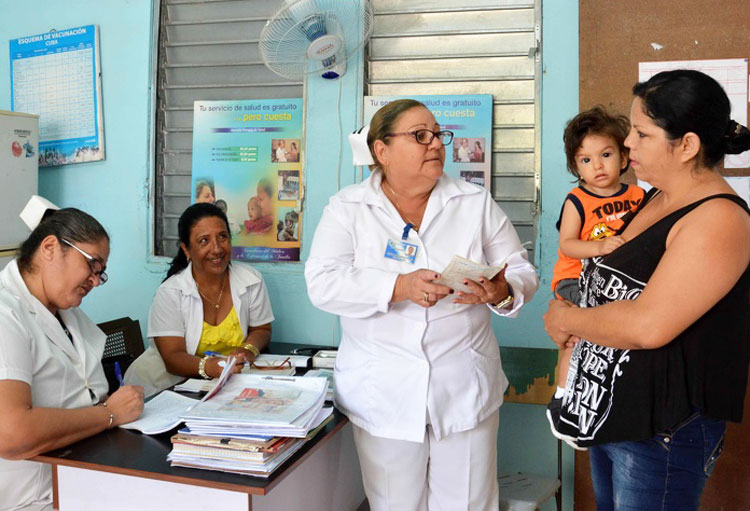The coronavirus contagion is now spreading faster outside China, where it first appeared in December, than inside. The Chinese regime’s extremely aggressive lockdown of hundreds of millions slowed the advance of the disease for now, but by March 2 the highly contagious COVID-19 strain had spread to at least 82 countries. The new hotspots are in Iran, South Korea, northern Italy and Japan.
COVID-19 is a new disease, and that makes it more dangerous. So far no government — except revolutionary Cuba — has mobilized all its resources to prepare and organize its people to fight it.
The death toll as of March 4 was 3,221 and confirmed cases were over 94,000. The march of the virus is compounding economic, political and social crises facing capitalist governments and working people around the world. The only good news is that the mortality rate so far is relatively low.
In the biggest slump since the 2008 financial crisis, world stock markets dropped steadily for a week. Finance ministers and central bankers rushed to assure wealthy investors they were readying new “stimulus” measures. But since interest rates remain near zero from previous stimulus efforts, there’s little room for anything significant.
Despite attempts by Beijing to restart production after the biggest quarantine in history, factory production there remains crippled. The extent of the industrial shutdown in China and its effect on production elsewhere is a sharp reminder of the limits of “globalization.”
Authorities in Iran have reported the second highest number of deaths, 77, and 2,336 coronavirus cases, but working people there think these numbers are significantly undercounted. Trying to deflect public attention from the government’s responsibility for the quick spread of the disease there and to the surrounding region, Iranian President Hassan Rouhani claimed fears about the virus are the result of “the enemy’s plots.”
But one in 10 Iranian members of parliament have tested positive and one has already died. Public trust in the Iranian regime has been further shaken after the earlier brutal repression of protests by workers and youth against the Iranian rulers’ wars abroad and economic crisis at home, as well as the government’s effort to cover up the Revolutionary Guard shootdown of a Ukrainian jetliner.
Opposition to rulers in Iran, Iraq
“We have a very negligent government,” Hamid Bahmani in Sanandaj, Iran, told the Kurdish publication Rudaw.
“Now is the time for the state and all the other media outlets to heavily focus on the coronavirus,” Sanandaj pharmacist Dr. Ramin Husseini said. “One more reason why the virus spread so fast was that the virus was hidden from the people after some people who had returned to Iran from China turned out to be infected with the virus. It was never announced.”
In Iraq, where people frequently visit back and forth with Iran, coronavirus cases are beginning to turn up. The government responded by shutting down all schools, universities and other public spots through March 7. They thought this would also mean the end of widespread protests against the government that have rocked the country for months. The opposite happened. Many of the students headed straight to protest centers in Baghdad and Diwaniya.
“The real virus is Iraqi politicians,” 18-year-old Fatima, a medical student from Baghdad, told Rudaw.
Outraged by the government’s refusal to prepare for the virus, the protesters began transforming the medical facilities they had set up to deal with assaults by the cops and Tehran-backed thugs into centers to deal with COVID-19.
They’ve distributed leaflets and organized lectures on coronavirus prevention, while volunteers have handed out free medical masks. They’re dispensing gloves and sanitizer. And volunteers in biohazard suits are lining up protesters and taking their temperatures.
“Even in normal times our health care system is totally run down,” Fatima said. “Now, on top of everything, we have a coronavirus outbreak.”
In the U.S. the government at every level is far from prepared as cases are beginning to spread. The capitalist rulers see public health expenditures as a drain on profits. They know they can afford whatever health care they may need. This is true whether Democrats or Republicans are in power.
Health and Human Services Secretary Alex Azar called for Congress to back the government’s proposal for $2.5 billion to fight the disease, including funding for developing a vaccine. But at a Congressional budget hearing Feb. 26 he flatly opposed the suggestion that such vaccines be made affordable and accessible to everyone.
“We can’t control that price because we need the private sector to invest,” said Azar, a former lobbyist for the Eli Lilly drug development outfit.
The U.S. rulers have one special problem that flows from their position as top imperialist dog. Washington has over 100,000 troops stationed where the outbreak is spreading, including in South Korea, Japan, Italy and Bahrain.
As the disease spreads in South Korea, the U.S. military has placed all its bases there — home to 28,500 troops — in lockdown. The U.S. and South Korean high commands have also shut down all joint military exercises “until further notice.”
‘Nobody should be turned away’
“Nobody should be turned away from medical help or hospitalization because they don’t have health insurance or money or the proper immigration papers,” Alyson Kennedy, Socialist Workers Party candidate for president, told the Militant March 3. “We demand government-provided health care at no cost for everyone.
“If workers won control over production — a fight that will come in the future as millions join to fight the effects of the capitalist rulers attacks on our class — the production of drugs and equipment needed to treat and ultimately vaccinate against the virus would be made a priority, regardless of profit,” said Kennedy. “Under a workers and farmers government — like they have in Cuba — the government would organize a crash course to mobilize working people to accomplish these goals and make the results available to people worldwide.”
Kennedy pointed to the inspiring example of internationalist solidarity given by 256 volunteer Cuban doctors and nurses in leading the fight against the Ebola epidemic, the opposite of the profit-driven priorities of the U.S. rulers. This story is told in the new book by Pathfinder Press, Red Zone: Cuba and the Battle Against Ebola in West Africa.


